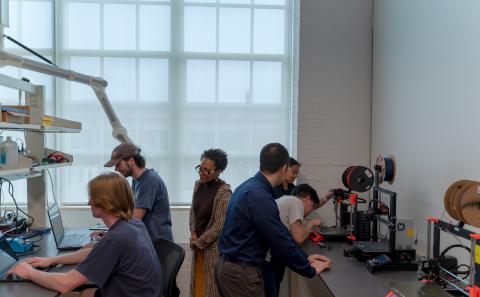Body
Image

Foster AI Learning for Smart Manufacturing
The integration of artificial intelligence (AI) into advanced manufacturing has promising potential to revolutionize productivity and generate new jobs in smart manufacturing. There is an urgent need to investigate "what to teach" and "how to teach" AI in order to prepare future workforce with the necessary AI skills. This project will initiate an age-appropriate career-driven AI educational program for high-school students and evaluate its effectiveness. We will develop manufacturing specific AI learning modules to teach high school students about additive manufacturing that will be equipped with real-time process monitoring, analysis and communication. We have three objectives: design AI learning modules of smart manufacturing for high-school students, develop project-based learning (PBL) experiences, collect firsthand survey data among participants and use data-driven methods to evaluate the effectiveness in improving AI learning and promoting future education and career in smart manufacturing. We will focus on underserved high schools and underrepresented groups to promote equitable learning. The successful outcomes of the project will be the concrete AI concepts and skills needed for smart manufacturing, the new PBL pedagogy for AI educational intervention, and the insights from data-driven analysis about the intervention. These outcomes will provide valuable lessons for advancing age-appropriate, career-driven, equitable AI learning for K-12 students at the AI era.
Pillar 1: Innovative Use of Technologies in Learning and Teaching
We will put the “Five Big Ideas in AI”, including perception, representation and reasoning, learning, natural interaction, and societal impact, into smart manufacturing and identify age-appropriate AI knowledge for high-school students. The AI learning modules include (1) perceiving the temperature and vibration, (2) representing operations with sensor data, (3) learning data patterns for different operations, (4) communicating operations with natural language, and (5) showing AI impacts on operations.
Pillar 2: Partnerships for Career and Workforce Preparation.
The recently emerging AI has prompted various industries to reimagine their work activities and reevaluate their requirements for the future workforce. Focused on underserved high schools and underrepresented students, this career-driven AI educational program will improve broader interest from diverse students in smart manufacturing and prepares underserved students to high-quality, higher-paying jobs in manufacturing, addressing the knowledge gaps and workforce shortage for smart manufacturing in the U.S.
Pillar 3: Strategies for Equity in STEM Education
This AI in smart manufacturing education program will employ project-based learning to stimulate broader career interest among a diverse range of students. Fifty rising high-school students from underserved school districts across the Black Belt region and rural low-income areas of Alabama will be recruited to participate in a one-week summer camp. Ten high-school teachers will be recruited to receive a three-day intensive professional training to continue the AI educational intervention at their respective schools.

Discipline(s)
Engineering
Emerging Tech (Artificial Intelligence, Quantum Computing, and Blockchain)
Target Gradespan(s)
High school (9-12)
Target Participant(s)
Youth / students
Educators
Girls (or women)
American Indian/Alaska Native participants
Black/African American participants
Hispanic/Latino participants
Project Setting(s)
Formal Education
Category
Exploratory
RAPID
Research Study